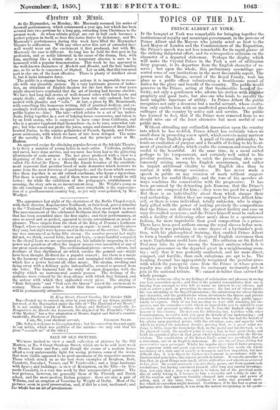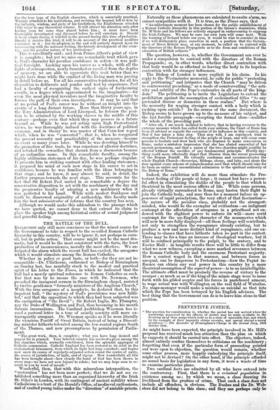1 TOPICS :-OF THE . DAY.
PRINCE, ALBERT AT YORK.
Tr the banquet at York was remarkable for 'bringing together the institutionsof royalty and municipal government, in the:persons of Prince Albert and the Mayors who jointly acted, as host to the Lord Mayor of London and the Commissioners of the Exposition, the Prince's speech was not less remarkable for its rapid glance at the striking industrial effort, and its retrospective criticism on the character of a departed statesman. Perhaps the display which will make the (crystal Palace in the Park a sort of utilitarian fairy pageant, is its departure from the English character of re- serve ; but upon the whole, this preliminary assemblage pre- sented some of our institutions in the most favourable aspect. The person next the Throne, second of the Royal Family, took his place as a public officer volunteering a troublesome round of duties for the glory and benefit of the country. The public would perceive in the Prince, acting at that businesslike boaril of fes- tivity, not only a gentleman who adorns his stationwith Aigidar propriety and good taste, but also one who lends to 'royalty the most tangible functions of utility. In Prince Albert the public recognizes not only a decorous but a useful servant, whose exalta- tion only enables him with an unaffected gracefuhiess to court the suffrages of the country by active suit and service. The public has learned to feel, that if the Prince were removed from us we should miss one of the • least obtrusive but most useful of our public men.
Without obtruding any outlandish innovation upon the country into which he has wedded, Prince Albert has certainly taken no small share in promoting anew spirit, which corrects many narrow notions of the English people. A pupil of German philosophy, he lends an exaltation of purpose and a breadth of feeling to his treat- ment of practical affairs, which exalts the common and reunites the. useful to the beautiful. At the same time, in a mood suited perhaps to his temperament, and certainly well suited to his peculiar position, . he awaits to catch the prevailing idea spon- taneously arising among his English countrymen, and rather to impart additional vitality to that English idea than to confuse it with strange associates. He has never made a speech in public on any occasion of mark without suggest- ing matter for useful thought; and the tone of his speeches al- ways combines the conservative with the progressive. It has been presumed by the detracting jade Rumour, that the Prince's speeches are composed for him ;—they were too good for a prince ! But . there is an individuality about them which stamps their real authorship. Either they are composed by Prince Albert him- self, or there is some individual, totally unknown, who is singu- larly gifted with the power of making precisely the.compositions that the Prince can deliver with the greatest facility and ease on very diversified occasions ; and the Prince himself must be endowed with a facility of delivering other men's ideas in a spontaneous fashion, far more improbable than good composition in a prince. There have been good authors among the royal classes• before now.
Perhaps it was partaking in some degree of a bystander's posi- tion, with his philosophical training, that enabled Prince Albert to form a broader estimate of the typical English statesman than a mere Englishman could have done. His criticism on Sir Robert Peel may take its place among the funeral orations which it is usuaL to pronounce on the departed. great in a neighbouring coun- try ; only that it was perfectly unaffected, and far more direct, compact, and forcible, than suchnulogiums arc apt, to be. The Leading Journal has appropriately recognized the peculiar grace with which the panegyric came from the Prince in whose person royalty was able to break from its customary taciturnity and to join in the national tribute. We cannot do better than extract the whole passage.
" There is but one alloy to my feelings of satisfaction and pleasure in seeing you here assembled again ; and that is the painful remembrance that one is missing from amongst us who felt so warm an interest in our scheme, and took so active a part in promoting its success ; the last act of whose public life was attending at the Royal Commission ; the admiration for whose talents and character, and the gratitude for whose devotion to the Queen and private friendship towards myself, I feel a. consolation in having this public oppor- tunity to express. Only at our last meeting we were still admirmg his elo- quence, and the earnestness with which he appealed to you to uphold by your exertions and personal sacrifices what was to him the highest object—the honour of his country. lie met you the-following day, together with other Commissioners, to confer with you upon the details of our undertaking ; and you mint have been struck, as everybody has been who has had the benefit of his advice upon practical points, with the attention, care, and sagacity with which he treated the minutest details ; proving that, to a great mind no- thing is little, from the knowledge that, in the moral and intellectual, as in the physical world, the smallest point is only a link in that great chain, and holds its appointed place in that great whole which is governed by the Divine wisdom. The constitution of Sir Robert Peel's mind was .peculiarly that of a statesman, and of an Engli=11 statesman. He was liberal .froon feeling but conserratire upon principle'. Whilst his impulse drove him to foster progress, his sagacious mind and gnat experience showed him how easily the whole. machinery of a state and of society is deranged, and how important, but how. difficult also, it is to direct its farther development in accordance with its fundamental principles, like organic growth in nature. It was also peeuliar to him that in great thingsas in small, all the difficulties and objections occurred
ties the true type of the English character, which is essentially practical. Warmly attached to his institutions, and revering the bequest left to him by the industry, wisdom, and piety of his forefathers, the Englishman attaches little value to any theoretical scheme. It will attract his attention only after having been for some time placed before him ; it must have been thoroughly investigated and discussed before he will entertain it. Should it be an empty theory, it will fall to the ground during this time of probation. Should it survive this trial, it will be on account of the practical qualities contained in it ; but its adoption in the end will entirely depend u; on its harmonizing with the national feeling, the historic development of the coun- try, and the peculiar nature of her institutions."
This is excellently said ; and from Prince Albert's point of view it is complete ; but yet we miss one remarkable trait which gave to Peel's character his peculiar confidence in action—it was poli- tical foresight. Looking upon his career as a whole, with all the lights of retrospection, newly furnished or recalled from the depths of memory, we are able to appreciate this trait better than we might have done while the conduct of the living man was passing in detail before us. For all his conservative tendencies, for all his disposition to deliberate and ponder and test by experience, Peel had ,a faculty of recognizing the earliest signs of forthcoming eventt, in a degree which approximated to the imaginative—for even the most physical inventors need the imaginative faculty to foresee the path of their own investigation. It may be said that at no period of Peel's career was he without an insight into the events of a long distant future. More than thirty years ago, in the Tory Administration of Lord Liverpool, he foresaw the posi- tion to be attained by the working classes in the middle of this century—perhaps even that which they may possess in a future beyond us. While he was yet acting upon high Protectionist views, he was thoroughly imbued with the doctrines of political economy, and in theory he was master of that Corn-law reveal -which, when he was " converted "—that is, when he recognized the present necessity and practicability of the measure—became an event so many years later. While he was devoting himself to the promotion of free trade, he was conscious of ulterior doctrines, and rebuked the cowardice that shrunk from a discussion because of an unfamiliar name. In this remarkable faculty, among the highly utilitarian statesmen of his day, he was perhaps singular. It presents him in striking contrast with other leading statesmen ; it prepared his mind at each new stage in his career to act in confidence, because he was familiar with the ideas belonging to that stage ; and he knew, it may almost be said, in detail, the further progress towards the next stage. This accounts for the fact that Sir Robert Peel united in so remarkable a degree the conservative disposition to act with the machinery of the day and the progressive faculty of adopting a new machinery when it was perfected to his hand. While with modest frankness and truth he disavowed originality of authorship, this faculty made him the best administrator of reforms that the country has seen. Although we would make this addendum to the passage which we have quoted, we cannot deny to that extract its claim to place thespeaker high among historical critics of sound judgment and graceful feeling.



























 Previous page
Previous page